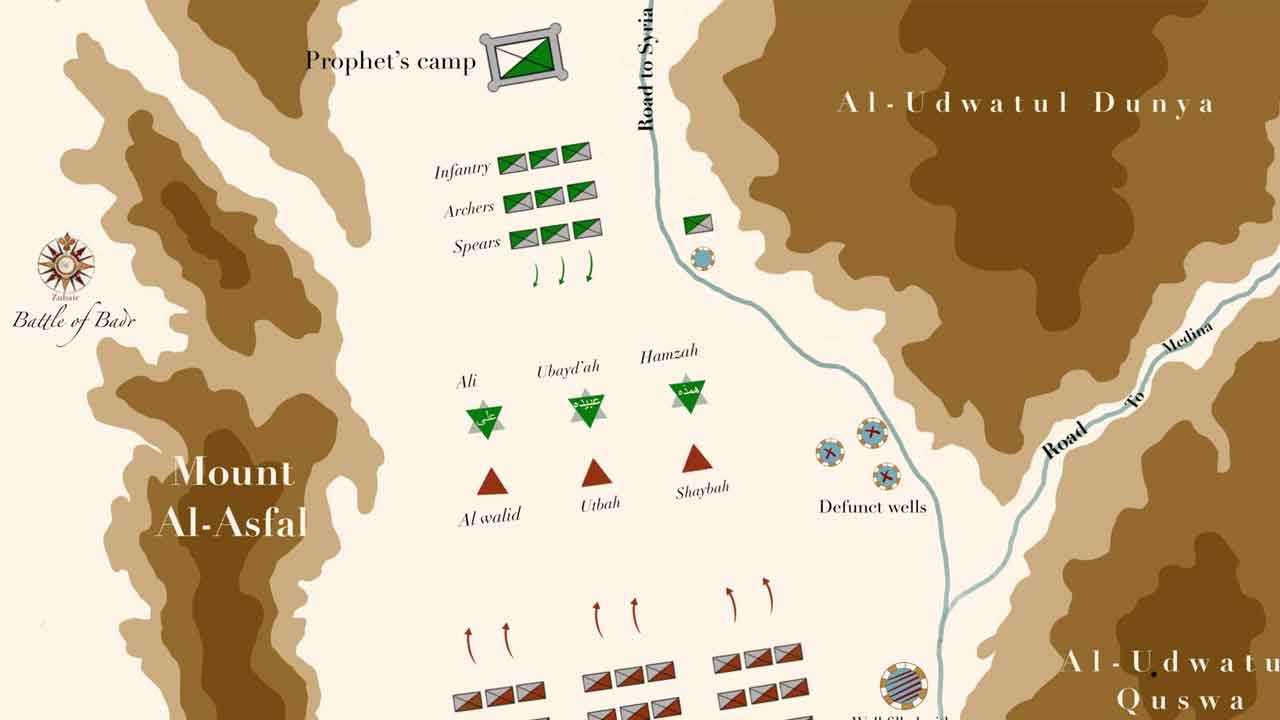The Battle of Badr is a significant event in Islamic history that took place on the 17th of Ramadan in the second year of Hijrah—the migration of Prophet Muhammad (PBUH) from his hometown (Mecca) to Yasrab, now called Medina, along with his companions (May Allah be pleased with them). The battle is considered a turning point for the Muslims who had long been persecuted by the Meccan aristocrats (the Quraysh who had forced them to migrate to Abyssinia and Medina).
After the Prophet Muhammad (PBUH) migrated to Medina, the Quraysh became more hostile towards the Muslims. The Quraysh now tried to persuade the inhabitants of Medina—Ansars—to stop their support for the Muslim migrants (Muhajireen) and also warned them of the consequences. The Quraysh knew that they had unjustly confiscated the properties and other belongings of Muhajireen that were left behind in Mecca and used them for their own worldly gains so they now considered the growing influence of Islam in the region as a constant threat for their trading caravans to Syria.
Triggered by the rumours that Muslims would attack their caravan, the Meccan elite decided to launch an attack.
It was at that crucial moment that after fifteen years of hardships and torture, Allah (SWT) finally instructed the Muslims in Quran to take a stand for their rights, fight for their religion, and defend themselves against the evil agendas of their enemy despite of the fact that they were outnumbered and ill-equipped.
The Battle of Badr was fought between 313 Muslims and a force of around 1000 Meccan soldiers.The Muslims had a great faith in Allah (SWT) and the leadership of the Prophet Muhammad (PBUH).
The battle lasted for a day, with the Muslims showing great courage and bravery in the face of overwhelming odds. The Meccan army was defeated, and many of their leaders were killed, including Abu Jahl, who was one of the Prophet’s fiercest opponents and the leader of the Meccan army.
The Battle of Badr was a significant event in the history of Islam for several reasons. Firstly, it marked the first major military victory for the Muslims, which gave them a much-needed boost in morale and confidence over their socially and politically strong enemies. Secondly, the battle demonstrated the power of faith in Allah (SWT) and unity.
After the war was over and the Muslim Army went back to Medina, the situation arose that how would the enemy captives be treated now? Many companions had different opinions but unlike his enemies, the Prophet (PBUH) showed mercy. Most of the prisoners were released upon payment of ransom and those who were literate were released on the condition that they teach ten persons how to read and write as their ransom.
It was reported that one prisoner said: “Blessings be on the men of Medina! They made us ride, while they themselves walked: they gave us wheaten bread to eat when there was little of it, contenting themselves with dates.” Surprisingly when the relatives and friends of the prisoners came later to free them for a ransom, some of the prisoners had already accepted Islam.
Allah (SWT) in Quran referred to the day of the Battle of Badr as “Yawm al-Furqan” which means the day of evidence or proof that truth has been distinguished from falsehood.
(Quran 3:13)
“There was a sign for you in the two groups who confronted each other (at Badr): One group fighting in the way of Allah, and the other disbelieving, seeing themselves as twice their number, with open eyes. And Allah gives strength with His help to whomsoever He wills. Indeed, there is a lesson therein for those who have eyes”



















